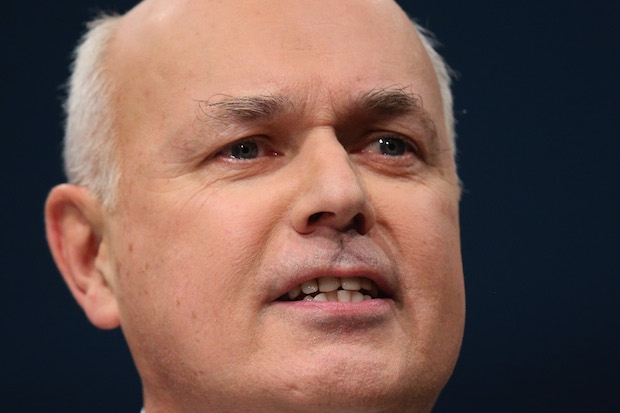Departmental questions have, by this stage of the parliament, all developed their own characters. There is the colourful combat of Treasury questions, often involving one Tory minister deploying a lengthy analogy involving handing over the keys to a car or arson to describe Ed Balls. Then there’s Michael Gove and Tristram Hunt’s lesson in rhetoric at Education questions. And then there’s the hour-long grudge match that enlightens no-one at Work and Pensions questions.
Today’s session was a typical example. Labour had plenty to attack on, from the implementation of universal credit to the cost of the employment and support allowance. And the party did attack. But the questions and the answers revealed very little about whether the government’s welfare reforms are under control or not, save that Mike Penning seems to think that the BBC cooked up its leak about ESA for ‘their own benefit’, without being fully clear what benefit there might be to a news organisation of a leaked document, other than that it is, er, news.
The session grew more heated as it progressed. David Winnick told Iain Duncan Smith that he was ‘sickened’ by the way ministers were answering questions about the most vulnerable. IDS told Labour that it had a ‘pathetic’ excuse for not visiting a JobCentre rolling out Universal Credit. Very little light was shed on the department. Here is the exchange between the Work and Pensions Secretary and Rachel Reeves:
Reeves: ‘At the start of this year 3,780 people were claiming Universal Credit. The most recent numbers show that 5,610 people are receiving the benefit. At this rate of progress, how long will it be until the 7.7 million households that are supposed to be receiving this government’s flagship benefit as the Secretary of State originally set out will be receiving it?’
Duncan Smith: ‘We’ve already made this clear. To date, around 11,000 are actually on the pathfinders, we are now rolling out… starting that rollout to another 9 sites beyond the 10 sites that we were doing the pathfinder in, there will be further changes and further enhancements and we expect and believe, according to the plan that we laid out, that everybody will be on by 2017.’
Reeves: ‘I think it’s the first time I haven’t heard the Secretary of State say his project is on time and on budget but we still hear total and utter complacency. Mr Speaker at this rate of progress it will take a staggering 1,052 years before Universal Credit is rolled out.
‘So what do we have? Universal Credit delayed, Personal Independence Payments delayed, employment and support allowance delayed, doesn’t the Secretary of State realise that his incompetence is not only wasting tens and hundreds of millions of pounds of taxpayers’ money but is also causing untold pain and hardship for she of the most vulnerable people in our country?’
Duncan Smith: ‘Can I just say to the honourable lady, Universal Credit, as I said, will be rolling out to the 90 sites and we will be delivering it safely and carefully, unlike what they did with tax credits. But can I also say in her general answer to what we’re doing, this government and this department has entered into the biggest welfare reform programme and we are getting more people into work, record numbers in work, record falls in unemployment, more young people into work, more young people who’ve been long-term unemployed back in work, the benefit cap, 42,000 people have been capped, 6,000 as a result have moved into work, Universal Credit, 600,000 claimant commitments signed, Universal Job Match has 6.9 million people registered, the work programme – no, she’ll want to hear this stuff because these are all records of success of welfare reform, but the Work Programme is 550,000 people they wrote off and never got a job now back in work and auto-enrolment under my right honourable friend, 3.6 million people into a workplace pension. This is a government reforming welfare, that is a government with no policies, no purpose and no prospects.’
Who is right? Is it Duncan Smith, who says it is better to roll something out more slowly than you’d anticipated so that you don’t muck it up (an admission that Universal Credit won’t be on time or on budget, but better to be late, more expensive and useful than on time, on budget and a hopeless mess)? Or is it Rachel Reeves, who says the programme is now moving so slowly that it will take over a thousand years before it is rolled out properly?
We have many more Work and Pensions questions before we’ll find out the answer, which will only come after the General Election. Either Labour will win and pause the project, presumably before deciding that it would be even messier to unravel it and that the principle is so important that it cannot abandon the reform. Or the Tories win. But if the Tories are in power, this is not an automatic guarantee that Universal Credit will succeed: conspiracy theorists in Whitehall maintain that the project could simply be on ice until after 2015 when IDS may have moved on from his position and it will be easier to ditch it. Other ministers seem more hopeful that it is safe, although no-one seems particularly keen to take on the Work and Pensions brief any time soon.







Comments